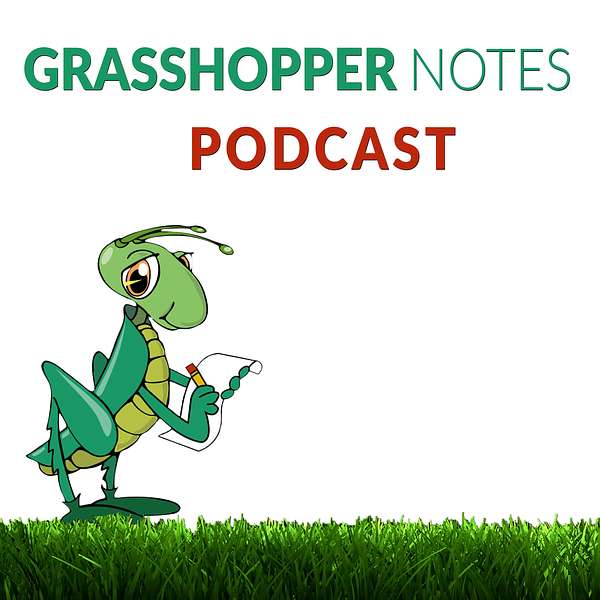
Grasshopper Notes Podcast
The Grasshopper Notes Podcast is hosted by John Morgan the man who has been billed as America’s Best Known Hypnotherapist.
John’s podcasts are a collection of guided meditations and bite-sized, mini podcasts which open you to new ways of thinking, communicating, and responding. You get a finer appreciation of how your mind works and how to use your internal resources to your best advantage.
See a video of John's background at the following link: https://www.youtube.com/watch?v=XbCPd00ok0I
In short, John Morgan is a people helper. Explore this channel and see what he can help you discover.
Grasshopper Notes Podcast
Guilty As Charged
Use Left/Right to seek, Home/End to jump to start or end. Hold shift to jump forward or backward.
How to chase guilt away is the topic of this mini podcast.
Grasshopper Notes are the writings from America's Best Known Hypnotherapist John Morgan. His podcasts contain his most responded to essays and blog posts from the past two decades.
Find the written versions of these podcasts on John's podcasting site: https://www.buzzsprout.com/1628038
"The Grasshopper" is the part of you that whispers pearls of wisdom that seem to pop into your mind from out of the blue. John's essays and blog posts are his interpretations of these "Nips of Nectar." Others have labeled his writings as timeless wisdom.
Most of the John's writings revolve around self improvement and self help. They address topics like:
• Mindfulness
• Peace of mind
• Creativity
• How to stay in the present moment
• Spirituality
• Behavior improvement
And stories that transform you to a wider sense of awareness that presents more options. And isn't that what we all want, more options?
John uploads these podcasts on a regular basis. So check back often to hear these podcasts heard around the world. Who wants to be the next person to change?
Make sure to order a copy of John's new book: WISDOM OF THE GRASSHOPPER – 21 Days to Creativity. These mini-meditations take you inside where all your creative resources live. And you'll come out not only refreshed but recommitted to creating your future.
It's only $16.95 and available at BLURB.COM at the link below. https://www.blurb.com/b/10239673-wisd...
Also, download John's FREE book INTER RUPTION: The Magic Key To Lasting Change. It's available at John's website https://GrasshopperNotes.com
Guilty As Charged
Now, guilt is easy to induce; just judge a past thought or deed by a current level of awareness and POOF you have guilt.
So it’s the judgement (thinking guilty) that has us feel the emotion known as guilt.
It’s helpful to have a couple of definitions of what an emotion is to make the point. Here are two from two men I learned a lot from: Eckhart Tolle and Jerry Stocking.
Tolle defines emotion this way: “Emotion: The body’s reaction to your mind.”
Jerry says it this way: “Emotion results when your illusion runs into reality.”
Both are, in effect, supporting the notion that thinking guilty produces feeling guilty.
The best example I can give for producing the self-destructive emotion known as guilt is this: A parent comes home from a trying day at work and finds the children doing the exact same stuff they did when the work day wasn’t so awful. He or she reacts poorly this time and berates the kids for behavior that really needs no admonishment. It’s just kids being kids. We’ve all had our version of this reaction.
Fast forward to 15 minutes later when you are less reactionary and you get the gift of awareness that you reacted poorly just minutes ago. You begin to feel guilty – meaning you're judging a past action by a present level of awareness. Seriously, how constructive is that?
It’s much more useful for all concerned for you to notice the slippery slope you’re about to go on and skip the guilt by addressing your behavior. “Hey kids, sorry I yelled. It was nothing you did; it was my fault. Sorry if I upset you.”
Guilt is the modern day sack cloth. We wear it as a punishment – one that’s self induced.
Best as I can tell, guilt’s only outcome is to make you feel worse. Now if feeling worse causes you to change your behavior, I’m all in. But my experience is guilt rarely does that; it just produces more guilt.
Here’s my claim: You’ll feel less guilty when you become more responsible for your behavior and own up to it. When you skip the guilt, you can more quickly comfort offended souls instead of raking yourself over the coals.
All the best,
John
